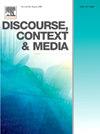Digital facilitation-as-a-process: The mismatch between promotional text and situated interaction
IF 3.1
2区 文学
Q1 COMMUNICATION
引用次数: 0
Abstract
This paper examines facilitation-as-a-process, which is characterized by its aims to challenge the traditional top-down leadership formats by empowering employees to achieve their goals without control. In this sense, the idea of facilitation reflects the ideologies of the New Work Order. By looking at both a promotional website of a digital platform and the use of this platform in situated interaction, the study shows how these ideologies are (re)constructed in and through promotional texts and how the claims are or are not enacted in actual in-situ interaction in two organizations. Drawing on critical discursive psychology and the distinction of Discourses (big-D) and discourse (little-d), it is first shown that New Work Order ideals are reconstructed on the website by relying on two key Discourses: The Discourse of Empowerment and the Discourse of Textualization. Secondly, using authentic chat discussions from two organizations, it is shown that the organizations do not orient to these ideologies presented on the website, but rather maintain and reproduce more traditional patterns of interaction, similar to, for example, classroom interaction. In this respect, the study shows how the promise of changing the traditional leadership formats and empowering employees, as presented in the facilitation literature and the platform’s promotional texts, remains purely ideological.
数字促进即过程:宣传文本与情景互动之间的不匹配
本文探讨的是 "促进过程"(facilitation-as-a-process),其特点是旨在挑战传统的自上而下的领导方式,让员工在不受控制的情况下实现自己的目标。从这个意义上说,促进的理念反映了新工作秩序的意识形态。通过观察一个数字平台的宣传网站以及在情景互动中对该平台的使用,本研究展示了这些意识形态是如何在宣传文本中或通过宣传文本被(重新)建构的,以及在两个组织的实际情景互动中这些主张是如何或没有被实施的。借鉴批判性话语心理学和话语(大-D)与话语(小-D)的区别,研究首先表明,新工作秩序的理想是通过两个关键话语在网站上重新构建的:赋权话语和文本化话语。其次,通过两个组织的真实聊天讨论,研究表明这些组织并没有以网站上呈现的这些意识形态为导向,而是保持并再现了更传统的互动模式,例如类似于课堂互动的模式。在这方面,本研究表明,促进文献和该平台宣传文本中提出的改变传统领导方式和增强员工能力的承诺如何仍然纯粹是意识形态的。
本文章由计算机程序翻译,如有差异,请以英文原文为准。
求助全文
约1分钟内获得全文
求助全文

 求助内容:
求助内容: 应助结果提醒方式:
应助结果提醒方式:


